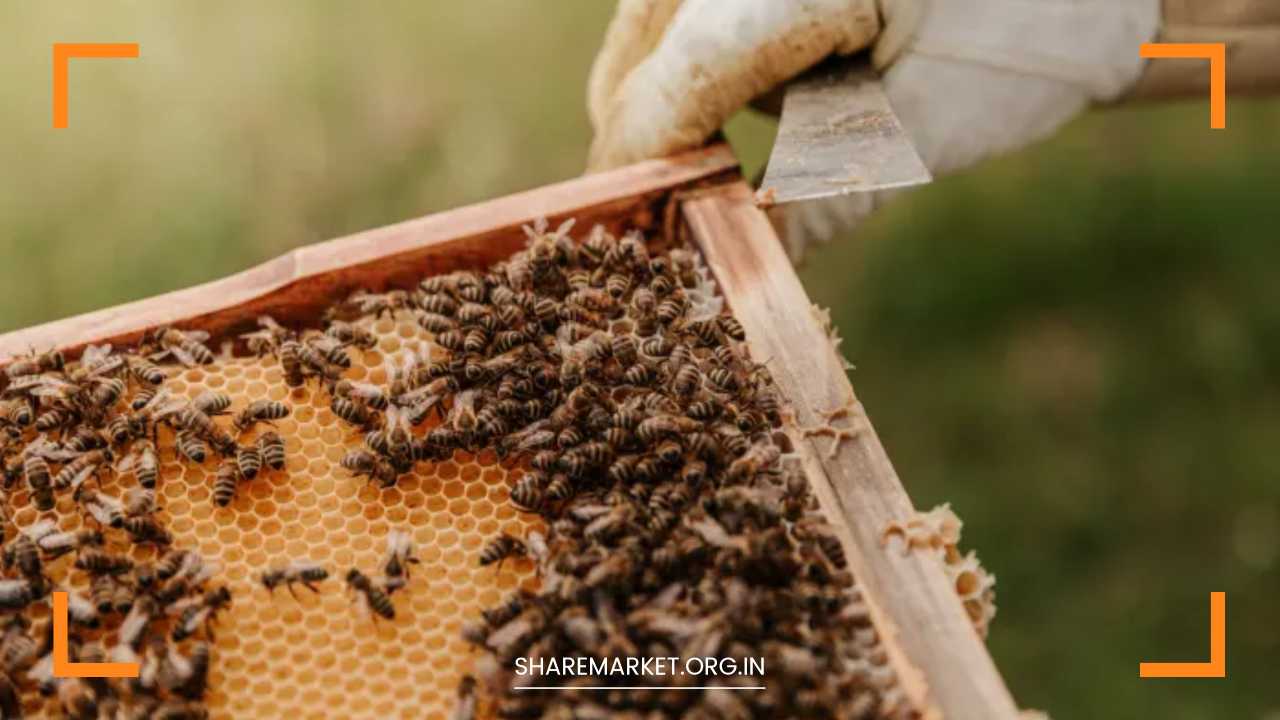Business Idea: Beekeeping

Beekeeping
Starting a Beekeeping Business
In today’s challenging economic landscape, where inflation rates are on the rise, many individuals are actively seeking ways to supplement their regular income.
Whether you’re a full-time employee looking for a side hustle, a farmer wanting to diversify your income streams, or an entrepreneur eager to tap into a niche market, beekeeping presents an exceptional business opportunity.
Why Beekeeping?
Beekeeping, or apiculture, is a business venture that can be pursued alongside your existing commitments, offering the potential for substantial monthly earnings.
One of the most enticing aspects of this business is its low initial investment requirement, which is further complemented by government subsidies available to support aspiring beekeepers.
In many regions, local and national governments recognize the ecological importance of bees and offer financial incentives to encourage beekeeping, often covering up to 85% of the startup costs.
The beauty of beekeeping lies in its accessibility to people from diverse backgrounds. Whether you are a farmer looking to enhance crop yields through better pollination or an urban dweller wanting to contribute to environmental sustainability, beekeeping can fit into various lifestyles.
Regardless of your prior experience, this business holds significant profit potential while keeping costs manageable.
Getting Started in Beekeeping
1. Obtain Proper Training and Knowledge
Before diving into beekeeping, it is essential to equip yourself with the necessary knowledge about bee biology, hive management, disease prevention, and honey production.
The world of bees is intricate and fascinating, and understanding their behavior is crucial for successful beekeeping. Consider these steps:
- Seek Guidance from Experienced Beekeepers: Connecting with seasoned beekeepers can provide you with invaluable insights. They can share tips on managing hives, identifying bee diseases, and even handling honey extraction.
- Attend Workshops and Training Programs: Many local agricultural extensions or beekeeping associations offer workshops and training programs that cover the basics of beekeeping and advanced techniques.
- Join Local Beekeeping Associations: Becoming a member of a local beekeeping club can offer ongoing education and support. These associations often host events, guest speakers, and networking opportunities that can enrich your understanding of beekeeping.
2. Create a Suitable Environment for Bees
Bees thrive in specific conditions, so it’s vital to choose an appropriate location for your hives. Consider the following:
- Access to Water: Bees need water to regulate hive temperature and for dilution of honey. Ensure a reliable water source is nearby.
- Nectar Sources: Your location should have abundant nectar-producing flowers, including wildflowers and crops. Diverse flora will not only nourish your bees but also support their health and productivity.
- Safe from Pesticides: Ensure that your bees are placed in an area with minimal pesticide exposure, as chemicals can harm bee populations and ultimately affect honey quality.
3. Choose the Right Equipment
Investing in high-quality beekeeping equipment is crucial for running a successful operation. Some essential equipment includes:
- Beehives: Choose durable and appropriate hives, such as Langstroth hives, top-bar hives, or flow hives, depending on your preferences and expertise.
- Protective Gear: Invest in bee suits, veils, and gloves to protect yourself while working with bees.
- Hive Tools: Essential tools include hive smokers, bee brushes, and uncapping knives, which will assist in managing hives and extracting honey.
- Honey Extraction Equipment: Depending on the scale of your operation, you may need a honey extractor, filters, and storage containers to process and package honey.
4. Source Bees from Reputable Suppliers
When acquiring bees, it’s essential to source them from reputable breeders or suppliers to ensure you receive healthy and disease-free colonies. Consider:
- Package Bees: These come in a box with a queen and several thousand worker bees. This is a common way to start a new hive.
- Nucleus Colonies (Nucs): A nuc contains a small colony, complete with a queen, workers, and brood. This is a great option for beginners as it gives you a head start.
- Queen Bees: If you’re requeening or starting new colonies, buy queen bees from reputable breeders to ensure strong genetics.
5. Regularly Inspect and Monitor Hive Health
Conducting regular hive inspections is essential for monitoring the health of your colonies. This practice helps identify potential issues early and allows you to implement preventive measures. Key aspects to consider:
- Check for Signs of Disease: Learn to recognize common bee diseases and pests, such as Varroa mites or American foulbrood. Regular inspections can help you catch these problems before they become severe.
- Assess Queen Performance: Ensure the queen is laying eggs and that there’s a healthy population of worker bees. A failing queen can lead to a declining hive.
- Monitor Honey Production: Track honey production levels to assess the productivity of your colonies and make informed decisions about harvesting.
6. Practice Sustainable Beekeeping
Sustainable beekeeping is not only good for your bees but also beneficial for the environment. Adopt practices that promote bee health and biodiversity, such as:
- Minimize Chemical Treatments: Whenever possible, avoid or limit the use of chemical treatments for pests and diseases. Opt for organic or natural solutions that do not harm the bees.
- Provide Diverse Forage: Cultivate a variety of flowering plants to create a rich environment for bees. This can include planting wildflowers, clover, and other bee-friendly plants.
- Responsible Hive Management: Implement practices that encourage healthy hive dynamics, such as rotating hives, providing proper ventilation, and ensuring sufficient space for bee populations.
7. Harvest Honey at the Right Time
Timing your honey harvest is crucial for both quality and quantity. Harvest honey when:
- Honey is Capped: Look for capped honey cells, which indicates that the moisture content is low, and the honey is ripe for extraction.
- Use Proper Techniques: Familiarize yourself with honey extraction methods to minimize disruption to the bees and maintain hygiene standards.
- Store Honey Correctly: Ensure that honey is stored in clean, airtight containers to prevent moisture absorption and fermentation.
8. Market Your Honey and Bee-Related Products
Once you’ve harvested your honey, it’s time to focus on marketing and sales. Here are some strategies:
- Develop a Marketing Plan: Identify your target market and create a comprehensive marketing strategy. This could include farmers’ markets, local grocery stores, or online sales.
- Create a Brand: Consider establishing a unique brand for your honey. A strong brand can help you stand out in a competitive market and foster customer loyalty.
- Leverage Social Media: Use platforms like Instagram and Facebook to showcase your products, share beekeeping stories, and connect with potential customers. Regular posts about the benefits of honey and behind-the-scenes glimpses of your operation can engage your audience.
9. Stay Informed and Connected
The beekeeping industry is continually evolving, so staying informed about the latest advancements, research, and best practices is crucial. Here’s how to remain engaged:
- Attend Industry Conferences: Participate in local, regional, or national beekeeping conferences to learn from experts and network with fellow beekeepers.
- Join Online Forums: Engage in online beekeeping communities to share experiences, ask questions, and gain insights from others in the field.
- Subscribe to Publications: Consider subscribing to beekeeping magazines or newsletters that offer valuable information on current trends and research in the industry.
10. Prioritize Bee Health and Welfare
The health and welfare of your bees should always be your top priority. Implement responsible beekeeping practices, including:
- Regular Health Checks: Conduct routine inspections to monitor for diseases, pests, and general hive conditions.
- Sustainable Practices: Promote biodiversity and sustainable farming practices that benefit bee populations and the environment.
- Education and Awareness: Share your knowledge about bees and the importance of pollinators within your community. Educating others can help raise awareness and promote the sustainability of bee populations.
The Benefits of Beekeeping
Embarking on a beekeeping business not only offers the opportunity to generate additional income but also contributes to environmental sustainability by supporting pollination and the preservation of bee populations. Here are some additional benefits of starting a beekeeping business:
Environmental Contribution
Bees play a vital role in pollinating many crops and wild plants, which is essential for maintaining biodiversity and food production. By becoming a beekeeper, you are directly contributing to the health of local ecosystems.
This aspect of beekeeping can be incredibly rewarding, knowing that you are playing a part in supporting the environment.
Flexibility and Independence
Beekeeping can often be done on your own schedule, making it a flexible business opportunity. Whether you’re looking for a part-time venture or a full-time occupation, beekeeping allows you to tailor your commitments to fit your lifestyle. This flexibility makes it an attractive option for many people.
Diverse Revenue Streams
In addition to honey production, beekeeping offers various avenues for generating income. Consider these potential revenue streams:
- Honey and Honey Products: Beyond raw honey, you can produce beeswax, propolis, pollen, and royal jelly, all of which are in demand in health and beauty products.
- Pollination Services: Offer pollination services to local farms or orchards. Many agricultural producers are willing to pay for pollination services to enhance crop yields.
- Beekeeping Equipment Sales: If you gain expertise in beekeeping, consider selling equipment or offering consulting services to new beekeepers.
Community Engagement
Beekeeping can foster a sense of community. Many local and regional beekeeping associations provide networking opportunities, educational resources, and collaborative events.
Engaging with other beekeepers can provide support and encouragement, making your journey more enjoyable and fulfilling.
Personal Fulfillment
For many, beekeeping is not just a business; it’s a passion. Working with these remarkable creatures can bring joy and fulfillment.
The process of nurturing bee colonies and witnessing their growth can be incredibly rewarding, providing a sense of connection to nature.
Final Remarks
In conclusion, beekeeping presents a unique and rewarding business opportunity that combines financial potential with environmental stewardship.
By following best practices, investing in education, and prioritizing the health and welfare of your bees, you can establish a successful and sustainable beekeeping operation.
Whether you’re looking to supplement your income or embark on a new career, beekeeping offers the flexibility, independence, and community engagement that many people seek.
As you embark on this journey, remember the significance of bees in our ecosystem and the joy that comes from nurturing these remarkable creatures.
With dedication, passion, and proper management, beekeeping can evolve into a profitable and fulfilling endeavor, providing you with a sense of satisfaction as you contribute to both your financial well-being and the overall ecosystem.
By embracing the adventure of beekeeping, you’re not just starting a business; you’re becoming part of a legacy that supports the environment, fosters community, and celebrates the incredible world of bees.

















